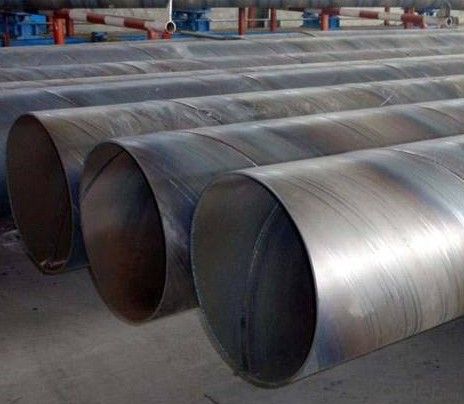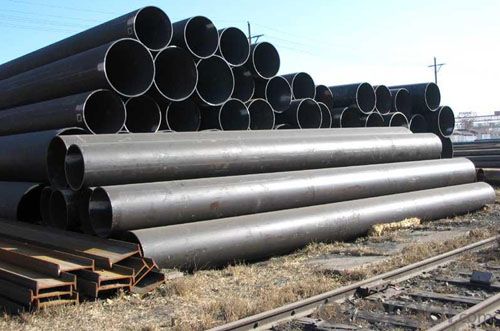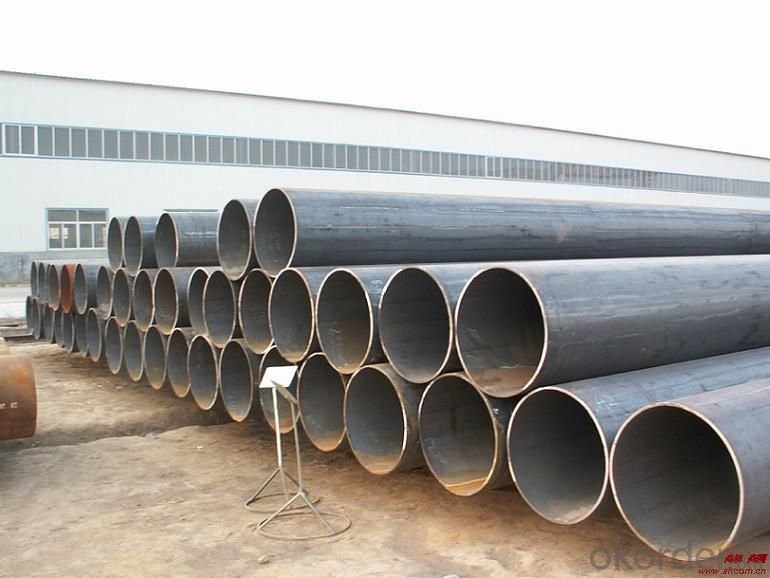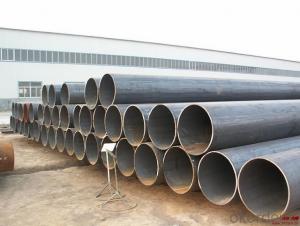LSAW Carbon Steamless Steel Pipe In Good Quality
- Loading Port:
- Qingdao
- Payment Terms:
- TT or LC
- Min Order Qty:
- 20 m.t.
- Supply Capability:
- 9000 m.t./month
OKorder Service Pledge
OKorder Financial Service
You Might Also Like
1、Structure of Seamless Pipe ASTM A106/53:
Seamless pipe is formed by drawing a solid billet over a piercing rod to create the hollow shell. As the manufacturing process does not include any welding, seamless pipes are perceived to be stronger and more reliable. Historically seamless pipe was regarded as withstanding pressure better than other types, and was often more easily available than welded pipe.
LSAW Steel Pipe
1 Size: 219-3200 mm*5-25.4mm
2 Material Q235/Q345/20#/X42-X65/J55 etc
Standard:
EN-10208-1/2, GB9711.1/2 etc.
Steel Grade:
B, X42 up to X70; L245, L290 up to L48
Usage:
Used for Steel Structure
Size:
LSAW from 219.1mm to 3200mm, thickness from 5mm to 25.4mm
Ends: Beveled ends with protector
Surface:
Bare / Varnish coating / FBE, 3PE coating DIN30670 / or by client option
Packing:
Casing, bundled shipping in containers or by break bulk vessel
2、Main Features of the Seamless Pipe ASTM A106/53:
• High manufacturing accuracy
• High strength
• Small inertia resistance
• Strong heat dissipation ability
• Good visual effect
• Reasonable price
3、Seamless Pipe ASTM A106/53 Specification:
Standard | GB, DIN, ASTM ASTM A106-2006, ASTM A53-2007 |
Grade | 10#-45#, 16Mn 10#, 20#, 45#, 16Mn |
Thickness | 8 - 33 mm |
Section Shape | Round |
Outer Diameter | 133 - 219 mm |
Place of Origin | Shandong, China (Mainland) |
Secondary Or Not | Non-secondary |
Application | Hydraulic Pipe |
Technique | Cold Drawn |
Certification | API |
Surface Treatment | factory state or painted black |
Special Pipe | API Pipe |
Alloy Or Not | Non-alloy |
Length | 5-12M |
Outer Diameter | 21.3-610mm |
Grade | 20#, 45#, Q345, API J55, API K55, API L80, API N80, API P110, A53B |
Standard | ASME, ASTM |
4、Packaging & Delivery
Packaging Details: | seaworthy package,bundles wrapped with strong steel strip |
Delivery Detail: | 15-30days after received 30%TT |
5、FAQ of Seamless Pipe ASTM A106/53:
①How is the quality of your products?
Our products are manufactured strictly according to national and internaional standard, and we take a test
on every pipe before delivered out. If you want see our quality certifications and all kinds of testing report, please just ask us for it.
Guaranteed: If products’ quality don’t accord to discription as we give or the promise before you place order, we promise 100% refund.
②How about price?
Yes, we are factory and be able to give you lowest price below market one, and we have a policy that “ for saving time and absolutely honest business attitude, we quote as lowest as possible for any customer, and discount can be given according to quantity”,if you like bargain and factory price is not low enough as you think, just don’t waste your time.Please trust the quotation we would give you, it is professional one.
③Why should you chose us?
Chose happens because of quality, then price, We can give you both.Additionally, we can also offer professional products inquiry, products knowledge train(for agents), smooth goods delivery, exellent customer solution proposals.Our service formula: good quality+good price+good service=customer’s trust
SGS test is available, customer inspection before shipping is welcome, third party inspection is no problem.
6、Seamless Pipe ASTM A106/53 Images:



- Q:How are steel pipes used in stadium construction?
- Steel pipes are commonly used in stadium construction for various purposes such as structural support, roofing, and plumbing systems. They provide strength and durability to the overall structure of the stadium, allowing it to withstand heavy loads and adverse weather conditions. Steel pipes are also used for the installation of HVAC systems, water supply lines, and drainage systems within the stadium.
- Q:Can steel pipes be used for underground gas storage?
- Certainly! Underground gas storage can indeed utilize steel pipes. Steel pipes are frequently employed in the transportation and storage of diverse gas varieties, such as natural gas, owing to their robustness, longevity, and ability to resist corrosion. These pipes can endure substantial pressures and can be tailored to meet the specific prerequisites of subterranean gas storage installations. Furthermore, materials can be applied to the surfaces of steel pipes, either as a coating or lining, to bolster their resistance to corrosion and avert any possible leaks. Nevertheless, it is crucial to ensure that the correct safety protocols and regulations are adhered to during the construction and operation of underground gas storage facilities to prevent any potential perils or hazards.
- Q:How are steel pipes used in the construction of hydroelectric power plants?
- Steel pipes are used in the construction of hydroelectric power plants for various purposes such as transporting water from the reservoir to the turbines, supporting and protecting electrical cables, and providing structural stability to the overall infrastructure.
- Q:What are the different types of steel pipe supports for overhead piping?
- There are several types of steel pipe supports for overhead piping, including pipe hangers, pipe clamps, beam clamps, and pipe rollers. Pipe hangers are used to support vertical pipes, while pipe clamps provide support for horizontal pipes. Beam clamps are designed to attach to structural beams and provide support for the pipe. Pipe rollers are used to allow the pipe to move freely, accommodating expansion and contraction.
- Q:Are steel pipes resistant to vibration?
- Yes, steel pipes are generally resistant to vibration due to their inherent strength and rigidity. However, the level of resistance can vary depending on factors such as pipe thickness, design, and installation. Additionally, the presence of external factors like fluid flow or mechanical forces can also affect the level of vibration resistance.
- Q:How are steel pipes classified based on their wall thickness?
- Steel pipes are classified based on their wall thickness into three categories: standard, extra strong, and double extra strong.
- Q:How do you calculate the pipe volume flow rate for steel pipes?
- The pipe volume flow rate for steel pipes can be calculated using the formula: V = A * V_avg, where V is the volume flow rate, A is the cross-sectional area of the pipe, and V_avg is the average velocity of the fluid flowing through the pipe.
- Q:Can steel pipes be used for conveying liquids and gases?
- Yes, steel pipes can be used for conveying both liquids and gases. Steel pipes are commonly used in various industries, including oil and gas, water supply, plumbing, and industrial processes, due to their strength, durability, and resistance to corrosion. They are capable of withstanding high pressure and temperature, making them suitable for transporting a wide range of liquids and gases such as water, oil, natural gas, steam, and chemicals. Additionally, steel pipes can be welded or threaded together, allowing for easy installation and maintenance.
- Q:What is lined pipe?
- Pipe lining is a new technology in recent ten years of development, also called composite pipe conveying fluid with different needs, the use of different materials to make the durability of the pipeline inner wall and outer wall of pipeline, to ensure the purity of the fluid, pipeline adaptability, performance is greatly improved, more extensive use.
- Q:How do steel pipes handle soil movement?
- Steel pipes are highly resistant to soil movement due to their strength and durability. The rigid nature of steel pipes allows them to withstand ground shifting and settling without deforming or breaking. Additionally, steel pipes are often installed with proper anchoring and support systems to further enhance their ability to handle soil movement.
1. Manufacturer Overview |
|
|---|---|
| Location | |
| Year Established | |
| Annual Output Value | |
| Main Markets | |
| Company Certifications | |
2. Manufacturer Certificates |
|
|---|---|
| a) Certification Name | |
| Range | |
| Reference | |
| Validity Period | |
3. Manufacturer Capability |
|
|---|---|
| a)Trade Capacity | |
| Nearest Port | |
| Export Percentage | |
| No.of Employees in Trade Department | |
| Language Spoken: | |
| b)Factory Information | |
| Factory Size: | |
| No. of Production Lines | |
| Contract Manufacturing | |
| Product Price Range | |
Send your message to us
LSAW Carbon Steamless Steel Pipe In Good Quality
- Loading Port:
- Qingdao
- Payment Terms:
- TT or LC
- Min Order Qty:
- 20 m.t.
- Supply Capability:
- 9000 m.t./month
OKorder Service Pledge
OKorder Financial Service
Similar products
New products
Hot products
Related keywords






























